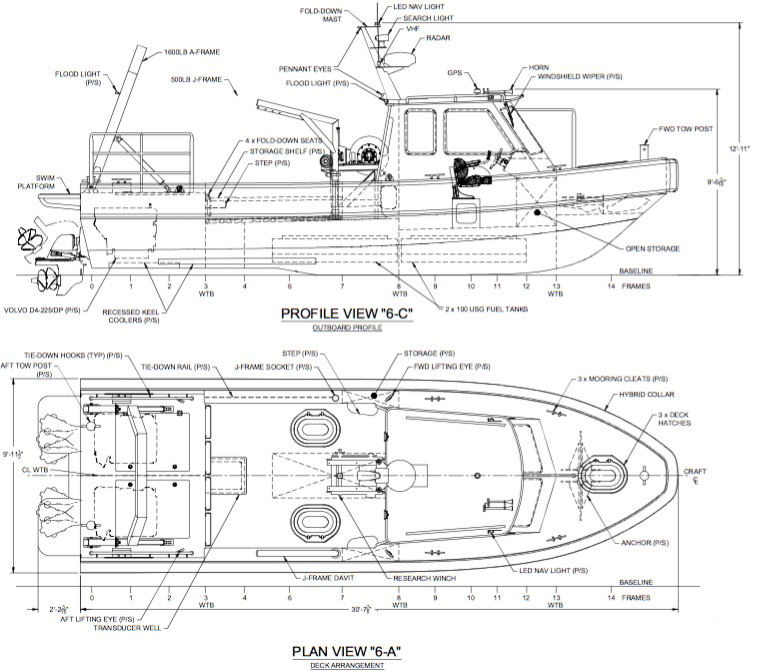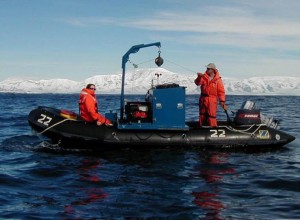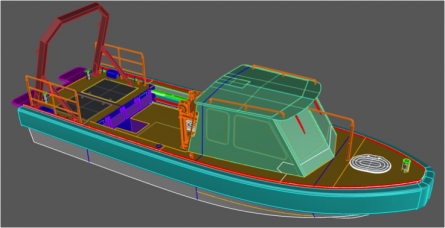Palmer Station, Antarctica
RHIBs to Expand Scientific Possibilities at Palmer
Purpose-Built to Directly Support Multidisciplinary Scientific Sampling Efforts
February 12, 2016

Robert Farrell; USAP Photo Library
For many years, the United States Antarctic Program (USAP) has utilized Palmer Station as a hub for its marine research activities. A key component of this research has been the use of small, short-range, inflatable boats to conduct nearby deployments. While these craft have served Palmer and its research community well, the need for a longer-range, more capable scientific vessel has become apparent.

Download the RHIB Design Schematic as a PDF
This led to a recommendation by the Blue Ribbon Panel (2012) that a new fleet of dedicated craft be pursued to meet the future needs of the station. This jumpstarted the development of the Rigid Hull Inflatable Boat (RHIB), a design built specifically for the challenging environment in the Antarctic and unique scientific requirements at Palmer Station. Amongst its key features include an enclosed, heated pilothouse to provide greater passenger protection, improved safety features, increased range, and more robust mechanical configuration. The craft is also designed to carry a wider complement of research equipment, allowing scientists to accomplish their work with greater ease and safety.
Making a Difference Where it Counts

Robert Farrell; USAP Photo Library
Deployments with Palmer's existing inflatable boats are often restricted to a 2-mile radius, a limitation that often impedes research activities that rely on fish, sediment, plankton, or other samples from further afield. During such trips, passengers are exposed to the elements. In the event of mechanical difficulties, the current boats are dead in the water until fuel or propulsion systems are repaired, or help arrives from Palmer.
The RHIBs address all of these problems, and more. Operational range has been increased 10-fold, achieving a 20-mile radius once fully deployed. Passengers will enjoy an enclosed space, free from wind, rain, and cold. In the event of a mechanical problem, each RHIB has been designed with fully redundant systems, including two engines that can operate individually and independently. Each craft will also draw from two separate fuel tanks - if one tank becomes damaged or contaminated, the second tank can be used without disruption.
Perhaps most importantly, RHIBs are purpose built to directly support multidisciplinary scientific sampling efforts. Among other improvements, this includes systems engineered for load-rated over boarding, which will allow scientific payloads to be dispatched and retrieved quickly and safely from the side of the boat.
The boats are built to accommodate the science, so the science no longer has to accommodate the boats.
Key scientific applications for the RHIBs include:
- Bottom trawls
- Sediment sampling
- Fish and crab trap deployment and recovery
- Improved scientific diver support
- Bio-acoustic survey deployments
- Survey operations for seabirds and marine mammals
Safety First
Each RHIB is also equipped with major improvements for the safety and comfort of its passengers, such as:
- Hybrid foam and inflatable collar for flotation redundancy
- Onboard and integrated navigation systems (critical for search & rescue and low-visibility)
- Capable of towing other small craft in emergency situations
- Dive ladders for rescue and retrieval
- Rated over boarding systems including stern A-frame, side J-frame and winching systems
We expect these substantial improvements to directly benefit the ongoing marine research efforts taking place at Palmer. Indeed, these boats have been designed in collaboration with stakeholders in the scientific community, and were custom made to withstand the unique challenges posed by Antarctic waters.
Coming Soon
Construction of the first RHIB is underway now, and will be completed in the coming months. The first RHIB will be ready for full time use in the beginning of the 2016/2017 season with the second coming online at the end of the 2016/2017 season.
Once deployed, these new craft support increased boating operations from Palmer, featuring improved safety and expanded support for innovative science!



